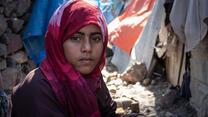In May and June 2016, an estimated 85,000 people fled from locations in and around Fallujah City, Iraq, following operations by the Iraqi military to retake those areas from ISIS. These civilians are now mostly living in makeshift camps in Ameriyat al Fallujah, Habaniyah Tourist City and Khalidiya, and in host communities in other parts of Anbar governorate, as well as a limited number in Baghdad governorate, having undergone a gruelling journey towards safety.
This journey has involved numerous obstacles to movement and associated protection risks, including threat to life. However, the recent events in Anbar and the resulting humanitarian consequences for civilians will be dwarfed by the access and protection challenges civilians will face when the anticipated military operations on Mosul begin, with over ten times as many people expected to flee. We have an opportunity now to learn the lessons of Anbar to minimise the risks facing civilians and to prepare ahead of Mosul.
The Norwegian Refugee Council and the International Rescue Committee issued a scathing report outlining the recent humanitarian failures in Fallujah as a direct consequence of the military operation to retake the city.



